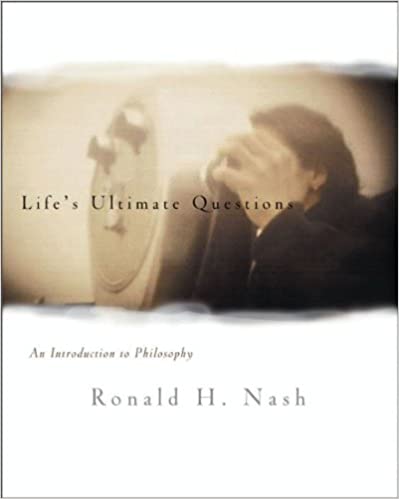A Brief Book Summary from Books At a Glance
By Steve West
About the Author
For decades, Ronald Nash served as a philosophy professor at various academic institutions. He was the author of numerous books and articles which explored various aspects of the Christian faith from a philosophical perspective.
Introduction
Life’s Ultimate Questions looks at philosophy from historical and topical perspectives. The importance of worldviews is highlighted, and conceptual systems are analyzed. Then, philosophical topics are examined. The treatment is both competent and engaging.
Table of Contents
Chapter 1 Worldview Thinking
Chapter 2 Naturalism
Chapter 3 Plato
Chapter 4 Aristotle
Chapter 5 Plotinus
Chapter 6 Augustine
Chapter 7 Aquinas
Chapter 8 The Law of Noncontradiction
Chapter 9 Possible Worlds
Chapter 10 Epistemology I: Whatever Happened to Truth?
Chapter 11 Epistemology II: A Tale of Two Systems
Chapter 12 Epistemology III: Reformed Epistemology
Chapter 13 God I: The Existence of God
Chapter 14 God II: The Nature of God
Chapter 15 Metaphysics: Some Questions about Indeterminism
Chapter 16 Ethics I: The Downward Path
Chapter 17 Ethics II: The Upward Path
Chapter 18 Human Nature: The Mind-Body Problem and Survival After Death
Glossary
Book Summary
Chapter 1: Worldview Thinking
A worldview contains our fundamental beliefs and is the lens through which we interpret reality. We need to understand our own view, as well as the worldviews of others. Worldviews contain beliefs about God, metaphysics, epistemology, ethics, and human nature. Believing or not believing in the existence of God creates a major worldview divide, but how God is defined can divide worldviews as well. Metaphysics is concerned with the nature of ultimate reality, and epistemology is concerned with knowledge. The nature of morality and ethics is vital to a worldview, as is the understanding of the constitution and nature of human beings. Christianity is not merely a religion, it is a worldview conceptual system.
Everyone is inescapably religious. We think on the basis of many presuppositions and assumptions, and within the context of numerous paradigms. People also believe things on the basis of biases and personal factors. Some philosophers have stopped trying to create philosophical systems, and many people in our society have embraced the contradictions of postmodernism. But worldview-level thinking is essential. Worldviews can be tested for viability. They can be tested according to reason (i.e. logic and non-contradiction); outer experience (i.e. its correspondence with what we know of the world and ourselves); inner experience (i.e. our consciousness, emotions, existential reality), and; the test of practice (i.e. can the theory be lived out harmoniously?). The right worldview allows us to see clearly; the wrong one leads to distortion and error.
Chapter 2: Naturalism
Contemporary naturalism has much in common with the naturalism of certain ancient philosophers. We will focus on the naturalists who believe that physical reality is all that there is. For naturalists, the universe is like a closed box: everything that happens occurs because of what is inside. Metaphysical naturalists believe that only nature exists, and nature is a materialistic, self-explanatory system that is totally uniform and deterministic. In ancient Greek philosophy, the atomists—as represented by Democritus—were naturalists. Democritus explained nature in terms of mechanics, with a focus on atoms and space. Atoms were eternal and had the same qualities, but they collided with one another and sometimes formed interlocking shapes and objects with unique characteristics.
[To continue reading this summary, please see below....]The remainder of this article is premium content. Become a member to continue reading.
Already have an account? Sign In
